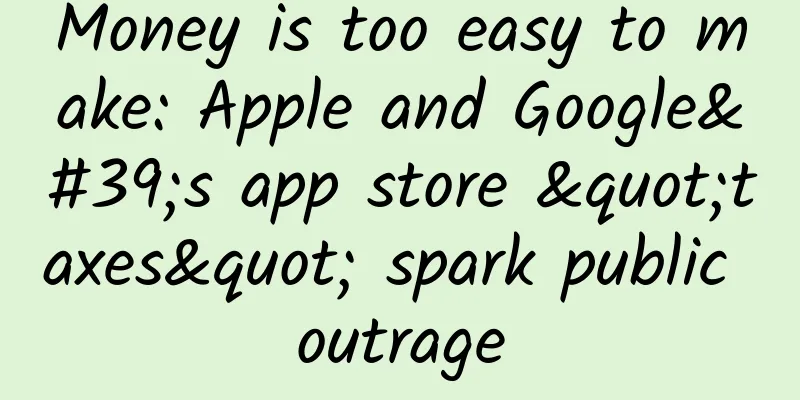Money is too easy to make: Apple and Google's app store "taxes" spark public outrage

|
Beijing time, August 23, morning news, more and more companies are now complaining about Apple and Google 's app stores, saying that the fees charged by the two technology giants for platforms connecting consumers and developer products are too high. Netflix and video game developers Epic Games and Valve are among the companies that have either sought ways to circumvent app stores or complained loudly about the unbearable fees Apple and Google charge for apps. Complaints about app store fees are common. But the number of complaints, coupled with new ways to reach users, regulatory scrutiny and competitive pressure, are increasingly threatening Apple and Google's digital gold mine. “It feels like something is going on here,” said Ben Schachter, an analyst at Macquarie. “There’s too much money to be made. And these companies simply don’t want to pay unreasonable fees to Apple and Google anymore.” Apple and Google each launched their own app stores in 2008, and they quickly became a powerful market that brought together the products of millions of independent developers and billions of smartphone users. But in exchange, the app stores charged developers 30% of the amount users paid them. For much of the past decade, Apple and Google have been praised for their app stores, which have helped fuel a new app economy that was worth $82 billion last year and is expected to grow to $157 billion by 2022. But things have changed recently. Smartphones and apps are key to attracting users, and there has been a growing criticism that app stores take too high a share of profits from developers. Rather than supporting innovation, some argue that Apple and Google are tax collectors that stifle economic flows between developers and consumers. "They are very aggressive about making sure the company is not 'skipping' taxes," said Alex Austin, co-founder of mobile company Branch. "They have a whole team dedicated to reviewing the flow of money to make sure they are not missing out." Last week, Schachter co-authored a report that said current app store fees are unsustainable. Apple and Google charge up to 30% for paid subscriptions and in-app purchases made on iPhones and Android phones that use Google's app stores for payments. About two years ago, the two companies reduced their fees on some payments to 15%. Macquarie estimates that if the App Store commission falls to between 5% and 15%, Apple's earnings before interest and taxes will fall by 21% in fiscal 2020. Google would lose 20% of its earnings in the same scenario, according to brokerage firms. The two tech giants are expected to each earn more than $50 billion in earnings before interest and taxes by 2020, according to analyst forecasts compiled by Bloomberg. That doesn't bode well for Apple investors who are counting on the App Store, which Apple frequently highlights with analysts on earnings calls, to continue to drive growth in the company's services business. Given its legal problems, Alphabet's Google is more vulnerable. A recent EU antitrust ruling requires the company to stop automatically installing its own app store on Android phones sold in Europe. This may force more app developers to bypass Google and attract consumers through the web or by partnering with other companies. "Everyone around the world is trying to find ways to boycott this American giant," Schachter said. "It's like it's wrong not to do it." Complaints about App Store fees grew louder in 2015 as Apple and Google moved deeper into digital content, moving from digital distribution partners to more of a competitor. That same year, music streaming company Spotify emailed customers that they should stop buying subscriptions through Apple’s App Store. On Tuesday, video streaming company Netflix also said it was testing the possibility of bypassing Apple's in-app purchases by directing users to its own website. Currently, Netflix's iPad and iPhone users can renew through the in-app purchase system on the App Store. Although this method makes subscriptions more convenient, the company must also pay Apple 15% of subscription revenue. As of May, according to Netflix's website, Netflix's billing on Google Play is no longer available for new or returning users. According to App Annie, Netflix is the top entertainment app by consumer spending on iPhones in the United States over the past 90 days and is also the most downloaded entertainment app on Google Play. The video game industry also began looking for ways to avoid app store fees this year. Valve's Steam, the largest distributor of PC video games, planned to launch a free iPhone app this year so that players can continue to play games when they don't have a computer. But Apple blocked the app. Soon, Apple updated its app review rules to ban any app that looks like an app store nested within an app or allows users to "browse, select, or purchase software that they do not currently own or have licensed," according to Reuters. More recently, Epic Games, the developer of the hit game "Fortnite," also chose to abandon Google's app store. Company executive Tim Sweeney said that in a world where publishers must bear all development, operations and maintenance for their own games, the 30% app store fee is "too high" to bear. “Middle distributors are obsolete,” he added. Since the game was released on Apple's App Store in March, Fortnite has made $200 million in revenue, according to Sensor Tower, which tracks app purchases. Sensor Tower estimates that Apple may have collected as much as $135 million in fees, while Google lost at least $50 million. A Google spokeswoman declined to comment. To defend the app store model, Apple and Google have repeatedly stressed that they can filter out fake apps and malware and distribute apps more widely. The two companies also handle identity and payment details, making the registration process more streamlined. Promotions in their app stores can change the future fortunes of app developers overnight. In fact, only the most popular online services can afford to leave the app stores of Apple and Google. For most developers, abandoning these powerful distribution channels is "foolish", said Daniel Levitas, senior vice president of App Annie. At present, many game developers have joined Epic. But Electronic Arts and Glu Mobile still continue the current distribution system, including app stores. Austin, co-founder of Branch, believes that this just proves the unreasonableness of the app store system. Most developers want to use the app store, but some are unwilling to pay fees to Apple and Google, so they must seize the opportunity of the web. “If you’re a startup, you obviously don’t have a way to attract paying users on the mobile web,” he said. “By removing app store fees, you effectively lower the last barrier for most companies.” |
<<: Microsoft will shut down Sway for iOS at the end of the year
>>: How do iOS 12 and Android 9 fight phone addiction?
Recommend
APP promotion: Serious user loss? You stepped on these pitfalls!
The fundamental solution is to analyze the reason...
The box manufacturer said that the ban will be rectified and will not affect the use of the box
Recently, the State Administration of Radio, Film...
Detailed explanation of marketing hot spots in November!
October is almost over and I’m feeling anxious. E...
Today is the beginning of the dog days丨Why are the dog days so hot?
Today marks the beginning of the dog days of summ...
A complete review of the 2018 Spring Festival marketing, take the four major tricks for free!
The longest road I have walked is the routine of ...
In addition to aspartame, plants can also be "sweet"!
Excerpted from: Inside and Outside the Classroom ...
Science and Technology News丨Scientists discover new structure of masseter muscle; my country ranks second in the world in the number of papers published in top international journals
【Today’s cover】 On December 27, after a night of ...
Video websites once again break out of the competition and welcome the first year of online dramas
After purchasing genuine copyrights, introducing ...
Why was the Melatonin advertisement successful?
From a user research perspective, it is more than...
How to avoid fragile code
[[165073]] The most common problem with legacy co...
Creative interpretation and placement strategies of WeChat Moments advertising cases
There are two types of advertisements for WeChat ...
Apple iOS 17 system hidden improvements: automatic clearing of SMS verification codes, sharing of AirTags, screen too close prompts, etc.
On June 6, at the WWDC 2023 developer conference ...
Tesla urgently investigates fire incident
Last Friday morning, a shocking Tesla electric car...
Taylor Swift's 10 albums (including the new album "Red") + various singles collection
*2019.12.10 New single "Christmas Tree Farm&...
Rumor has it that the iPhone 7 will have a built-in projector and a liquid metal body
Although the iPhone 6 was released not long ago, ...









